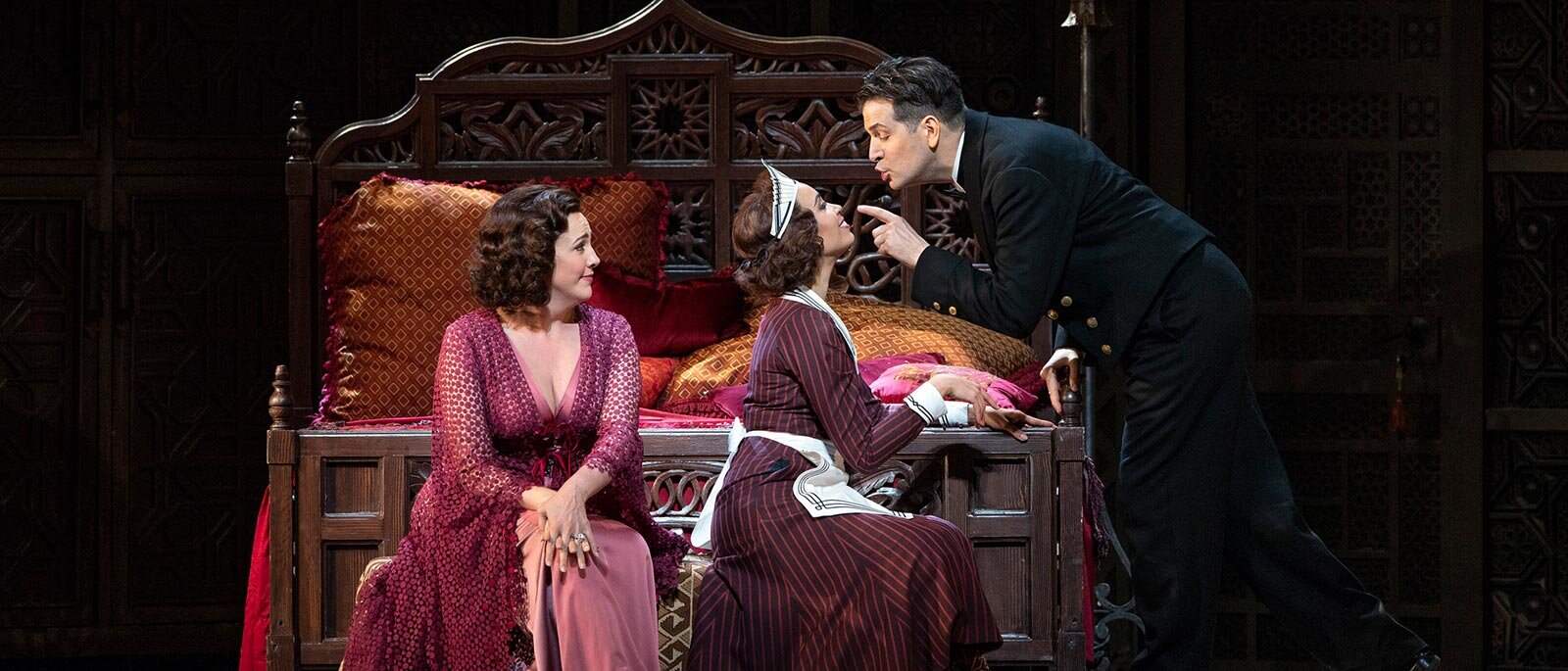'Figaro' at the Met, a Marriage of Conducting Talent and Vigorous Cast
/By Raymond Beegle
1/15/2020
Photo credit: The Metropolitan Opera
“The music of all creatures…” writes our great Thoreau… “has to do with their loves, even of toads and frogs. Is it not the same with man?” So it is, that the operas of Mozart, whether the subject be politics, history, or mythology, are, at their core, from Apollo et Hyacinthus, to Die Zauberflöte, the music of love. This is especially true of Le Nozze di Figaro, the work that Brahms called sublime, created by the composer that Tchaikovsky called “angelic and pure.” Beginning with a slender stream of eighth notes, it flows ineluctably, through various surprises and complexities, to the happy, open sea of the final chorus, “Ah, tutti contenti saremo così.” It is, perhaps, as close to perfection as man can hope for, and demands as much from the cast, conductor, orchestra, and stage director.
The soloists on this occasion (December 14, 2019), all vigorous, all visually suited to their roles, proved to be superb actors, each with an instinctive comic flair, delivering many wonderful comic moments. Especially hilarious were Susanna and the Countess, perched together on the countess’s bed singing to recalcitrant Almaviva, “…le vostre folie non mertan pieta,” as well as Cherubino making his dramatic leap from the Countess’s window. Superb also was their ensemble singing, often as rhythmically pristine, accurate in pitch, and homogeneous as one hears from the best chamber choirs. One forgives the notable exception of the a cappella fragment at the end of the third act sextet, but that almost invariably seems a clumsy affair in live performances.
Among the principles, Nadine Sierra was a particularly fine Susanna not only because of the sheer beauty of her voce, but because of the human element expressed in its timbre, the presence of a soul, although Beaumarchais might prefer another word. The central message of his work, however, is, indeed, that Susanna has a soul, and that it is every bit as precious as the soul of any Count or Countess. Her “Deh vienni, non tardar” was nothing short of ravishing, with beautifully spun tops and a magnificent, graceful line that leads one to read between the lines – to see the human heart, its ardent desires, its nobility. One understood the seriousness behind the comedy, the issue that Beaumarchais could express only through humor, of the heart-breaking injustice common people suffered at the hands of their overlords.
Gaëlle Arquez also made a deep impression as Cherubino. She too possesses the quality of voice that speaks of her humanity, as well as the dramatic skill to convince us that she is a young boy, the captive of adolescence, as well as the captive of tyrannical Count Almaviva. The Count of Adam Plachetka as well, both vocally and dramatically, was ideal. Luca Pisaroni’s Figaro struggled a bit in the upper register, the result, perhaps of, a temporary physical indisposition, but delivered a convincing reading of the young and clever servant. The sweet-sounding Susanna Phillips was a winning Countess during recitatives and ensembles, but she has, at present, neither the stature nor amplitude of voice to meet the demands of the role, especially in her two great arias, the only extended tragic elements in the work.
The Alma Mater of this production was the disciplined and informed Antonello Manacorda, who brought this “musical miracle” to vibrant life. The Metropolitan Opera Orchestra is not an easy lion to tame. It is a temperamentally volatile institution varying widely in quality and character, reflecting, sometimes pitilessly, the merits and faults of a given conductor. I have heard them sound like a Mariachi band at their worst, but tonight, under Maestro Manacorda’s baton, they were at their opulent best, which is, perhaps, the best in the world. This relatively young conductor seems untouched by the temptations that have often spoiled the gifts of the gifted, who end up flying all over the globe, performing under-rehearsed material, making much money, wielding much power, basking in acclaim. Manacorda is a brilliant talent, and one hopes, prays, wishes, that he will not succumb to these temptations as mounting recognition, which seems inevitable, comes his way. He produced from the outset a malleable but relentless rhythmic current, coursing with the greatest vitality and assurance through the work’s dramatic landscape. A deft musical stroke was the occasional absence of the introductory rolled chords of the harpsichord before recitatives, allowing the flow of the text to continue uninterrupted. The great zenith moments of the work were carefully shaped, carefully set in proportion one with the other, each making its eloquent mark. The extended silence Mozart asks for, just before the Countess forgives her husband was especially moving, giving the necessary dramatic weight that Susanna Phillips’ singing alone might not have carried. Most beautiful of all was the moment where the marriage of Figaro and Susanna truly takes place, where their trust in each other is sealed as they sing “Pace pace, mio dolce tesoro…” It was beautifully sung, beautifully acted, beautifully staged, and seemed to cast its spell over the entire ensemble. Perhaps because tonight marked the final performance of this run, one felt that nostalgia became palpable at this point, a sense of gravity, an acute awareness that all beautiful moments pass. Whatever the cause, it was a powerful finale to a powerful performance.
Raymond Beegle reviews classical music and opera for the New York Observer and Fanfare Magazine. For many years he was Contributing Editor of Opera Quarterly, the Classic Record Collector (UK), and also appeared on The Today Show (NBC) and Good Morning America (CBS). As an accompanist, he has collaborated with Zinka Milanov and Licia Albanese. Currently Mr. Beegle serves on the faculty of Manhattan School of Music in New York City.




